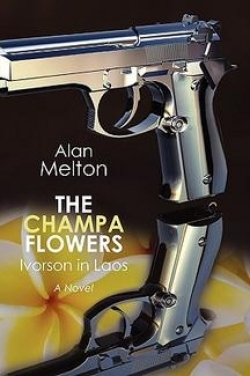The Champa Flower
Ivorson in Laos
One of the most controversial times in American history, the Vietnam War has inspired numerous works of fiction as well as political debate. The Champa Flowers is an outstanding example of the merger of real events with the imaginative escapades of Peter Ivorson, a CIA officer on a special mission involving espionage and inevitable counter-espionage.
Emphasizing behind-the-scenes intelligence maneuvers over the stereotypical ferocity of warfare, Melton succeeds in creating a gripping adventure that explores the ingenious methods employed to curtail bloodshed in parts of the world where upheaval is the norm. The gun on the cover of this novel is a reminder that violence certainly does make a brutal appearance, but the plot is an extraordinary surprise to a seasoned book lover seeking more than an action-oriented, “bang-bang and it’s over” approach toward conflict.
The story is set in 1968 Vientiane, the capital of Laos, where the U.S. and North Vietnamese embassies are less than two miles apart. Assigned to steal the diplomatic code from the enemy, Ivorson is thwarted by his own colleagues, one who intends to take credit for any success, as well as his French-Vietnamese lover who, in a spine-tingling mess, helps land him in a swamp with experimental, high-tech equipment. Headed for disaster in a romantic relationship that hides its true motivations, though rather apparent to the reader, Ivorson succumbs to seductive persuasion that is perhaps his only downfall. Polished and meticulous in his procedures, this cynical, experienced agent knows how to avoid every trap but one. His predecessor died in a failed attempt at obtaining the code, but Ivorson’s fate remains uncertain as he progresses through a treacherous world of deceit and desire, where friend and foe no longer have a recognizable distinction.
A capable storyteller, Alan Melton presents this exciting page-turner in a laconic delivery that will captivate even the most jaded critic. He writes with urgency, propelling his attention-grabbing story at a rapid pace: “A long, thick shape in the vegetation just in front of him began to wriggle. Ivorson’s stomach clenched into a fist of fear. He tried to jump backward and lost his balance. He fell with a splash. The snake’s head and his own were less than a yard apart. Its mouth was opening. He felt a shout forming in his throat.”
Reminiscent of Hemingway’s journalistic, no-frills style, Melton captures the essence of his predecessors through the use of powerful description and vital dialogue. This brilliant author does not resort to melodrama or overplayed scenes to snag interest. A straightforward technique and a strong plot make what could have been a mediocre novel a winner instead.
Reviewed by
Julia Ann Charpentier
Disclosure: This article is not an endorsement, but a review. The publisher of this book provided free copies of the book and paid a small fee to have their book reviewed by a professional reviewer. Foreword Reviews and Clarion Reviews make no guarantee that the publisher will receive a positive review. Foreword Magazine, Inc. is disclosing this in accordance with the Federal Trade Commission’s 16 CFR, Part 255.

